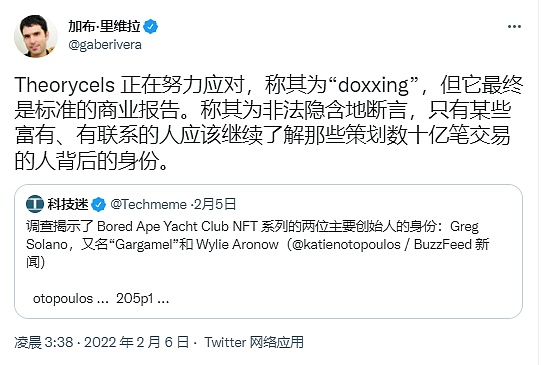The identity of the Bored Ape NFT co-founder has been exposed, and anonymity has once again become a focal issue in Web3
Author: Heimi, Baize Research Institute
Bored Ape Yacht Club (BAYC) NFT was launched in April 2021 and has achieved unprecedented growth in less than a year. BAYC has been sought after by many celebrities and has collaborated with companies like Adidas, making it one of the most successful NFT series to date. Holding an NFT from this series also serves as a club membership card, granting access to exclusive member benefits and unlocking new events in the future.
Jimmy Fallon, DJ Khaled, Steph Curry, and Post Malone all own BAYC NFTs. However, in recent months, other celebrities have joined this ranks. Rapper Eminem spent 123.45 ETH (approximately $462,000) to purchase BAYC #9055. Comedian Dave Chappelle spent 99 ETH (approximately $371,000) to buy BAYC #8343.

Image: Jimmy Fallon showcasing the bored ape on The Tonight Show
According to data from NFT-Stats, the Bored Ape Yacht Club series NFTs sold 162 times in the past 7 days, with a total sales volume of $57.12 million and an average price of $325,400.
In December last year, the well-known blockchain game development company and metaverse platform Sandbox's developer, Animoca Brands, announced a collaboration with BAYC to create a blockchain game based on the NFT series. The company stated that it would adopt a Play-to-Earn mechanism, expected to launch in the second quarter of 2022.
Although BAYC has become the most prestigious and expensive NFT collection in the crypto industry, do you really know the founders behind BAYC?
Anonymous Founders Exposed
Last Friday, the news media BuzzFeed News, which focuses on trending topics, published an article titled "We Found The Real Names Of Bored Ape Yacht Club's Pseudonymous Founders," revealing the identities of two of the four co-founders of the company behind BAYC, Yuga Labs. The founders known by the pseudonyms "Gargamel" and "Gordon Goner" are actually 32-year-old writer and editor Greg Solano and 35-year-old Wylie Aronow from Florida. Yuga Labs' CEO Nicole Muniz later confirmed their identities.
These two founders had previously given anonymous interviews to media outlets like Rolling Stone and The New Yorker, discussing the origin story of BAYC. In the interviews, they mentioned that they are both in their 30s, met while growing up in Florida, and share literary aspirations. They were both interested in the crypto industry and wanted to create some kind of NFT series. Later, they proposed the concept of wealthy apes living in a swamp clubhouse, hired a freelance illustrator to design the bored apes' images, and collaborated with two engineers who remain unknown as co-founders, known by the pseudonyms "Emperor Tomato Ketchup" and "No Sass."
It turns out that their interview statements roughly align with their real identities:
Greg Solano, "Gargamel," serves as an editor and book reviewer on several literary websites and graduated from the University of Virginia. He co-authored a book about World of Warcraft with a game designer.
Wylie Aronow, "Gordon Goner," lived in Chicago for a while, where he was interviewed for a "Reader's Choice" story by the Chicago Tribune.
Subsequently, the article uncovered Aronow's "dark history": In May 2021, the crypto exchange Bitmex filed arbitration against Aronow over a controversial domain name. Aronow purchased the domain bitmex.guru in 2018, which Bitmex claimed was intended to deceive users looking for the real Bitmex website. Although Aronow did not appear in court, the arbitrator ordered him to transfer the domain to Bitmex during the proceedings.
The article sparked intense discussions on the social media platform Twitter.
Some members of the crypto community harshly criticized BuzzFeed, accusing it of violating the privacy of the two founders through "doxxing"—a term typically referring to the collection and publication of personal or private information via the internet, commonly known as "human flesh search."
Popular crypto podcast Cobie deemed the article "lowbrow," pointing out that BuzzFeed "doxxed people for clicks and ad revenue"; Mike Solana, vice president of venture capital firm Founders Fund, shared the same view, arguing that revealing identities as "some kind of massive exclusive news" was disgraceful.
Ryan Selkis, founder of crypto research firm Messari, bluntly stated: "This is like an ugly piece of language attacking ordinary citizens just for fun, clicks, and profit."

The crypto community seems to believe that BuzzFeed and its journalists did something wrong. However, outside the crypto realm, a completely different perspective has emerged.
Gabe Rivera, founder of the popular Silicon Valley tech news site Techmeme, described the article as standard business news and questioned why only a few insiders should know who the people behind a multi-billion dollar company are.

Others pointed out that the reporter who provided the report obtained the identities of these individuals simply by searching Yuga Labs' company records, including company registration documents accessible to anyone on the internet. Browsing such records is a common practice for lawyers, journalists, and law enforcement, and does not fit the traditional definition of "human flesh search."
Some also noted that since BAYC is a billion-dollar brand, the question of whether it is appropriate to disclose the identities of the two co-founders depends on whether they are truly "ordinary" individuals.
Perhaps This Is a Debate About Web3
Anonymity is a feature of Web3, which centers around crypto payments and NFTs, helping to address some of the issues faced by internet companies in the Web2 era. As NFTs and Web3 gradually become mainstream, the handling of large sums of money by companies operating under pseudonyms presents a new economic and legal issue.
In the traditional business world, a company's CEO or founders use their real names rather than pseudonyms. For publicly traded companies, executives must be mentioned in disclosures and reports to the Securities and Exchange Commission. For private companies, banking regulations and KYC laws require that banking services can only be provided to companies holding accounts with real information. These laws are partly designed to prevent terrorists and criminals from conducting business in the U.S.
According to a recent report by blockchain data firm Chainalysis, which tracked at least $44.2 billion worth of cryptocurrency sent to ERC-721 and ERC-1155 contracts, the NFT market may also exhibit behaviors similar to those in the crypto market, such as [wash trading] and [money laundering], where transactions are manipulated to inflate NFT values and launder money through NFT purchases.
While BAYC's two co-founders Solano and Aronow have no particularly dangerous history, if founders of other NFT series have criminal histories or extreme political inclinations, could this lead investors to regret spending large sums on NFTs?
Gary Kalman, director of the U.S. office of a transparency advocacy organization, believes: "Knowing who you are dealing with should not be difficult; it's a very basic thing. While venture capital firms can learn more about who the true behind-the-scenes people of a company are, ordinary NFT holders cannot. Without transparency and openness, ordinary people who cannot conduct due diligence like large companies will face problems."
However, blockchain technology also represents a new and improved form of corporate transparency to some extent.
Mark Cuban, an entrepreneur and holder of two BAYC NFTs, stated: "We can hold criminals accountable because all transactions are based on smart contracts and recorded on the blockchain. While this is in contrast to traditional business practices, how many collectible companies disclose all their sales and business processes?"
Soona Amhaz, a partner at crypto-focused venture capital firm Volt Capital, believes that anonymity can bring some benefits. Unlike traditional entrepreneurial methods, it frees founders from investors' judgments based on their appearance, alma mater, social class, gender, or race.
However, the two involved founders seem to be calm and composed. Shortly after the article appeared, they posted on their personal social media in a "Me in Web2 vs. Me in Web3" format, seemingly showcasing their perspective: the emergence of Web3 and its decentralized technology is expected to make anonymity easier and avoid the exposure of the Web2 era.


In the future, as BAYC grows into a representative brand of Web3 rooted in multiple industries such as film, music, and the metaverse, their views will also be put to the test.










